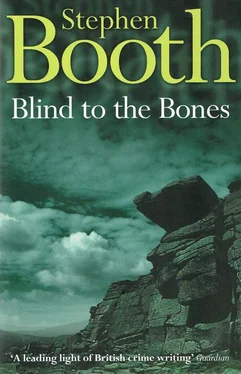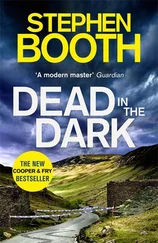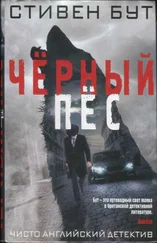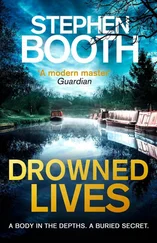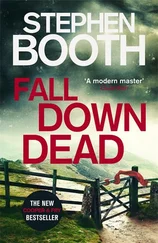TV had a lot to answer for in the Peak District. In Buxton, a new golf driving range had recently opened under the name ‘Peak Practice’, in reference to a popular medical soap opera.
This morning, the pathologist would have begun to examine the skeletalized remains found in Withens. No doubt officers from other divisions would be phoning the CID room all day with jokes about E Division being so desperate for bodies that they had started to dig up the graveyards.
The morning briefing was a downbeat affair. Many of the officers knew of Emma Renshaw’s disappearance two years previously, and they weren’t immune from the assumptions being made about the skeleton unearthed in the Withens churchyard. It hardly seemed necessary to wait for the postmortem results. Nobody doubted Howard Renshaw.
For Diane Fry, the fact that the body had turned up in Withens was not what she had expected. But she found it had the result of forcing her to look at the enquiry from a completely different direction. That wasn’t a bad thing at all. It was too easy to fall into assumptions.
Now her focus had to be on Withens, and her list of potential suspects had narrowed dramatically, from the entire population of two of the largest cities in Britain to a handful of familiar names, each of whom had a relationship of some kind with Emma. For the Renshaws, the discovery of the skeleton was devastating. But for Fry, it made an impossible task look suddenly like a breeze. Some forensic evidence from the remains and from the scene, a whiff of an opportunity and a motive, and the case could be wrapped up in no time, after all.
Best of all, there were more resources becoming available with the latest development. She wouldn’t have to rely on Gavin Murfin alone any more.
As for the Neil Granger enquiry, nearly twenty lorry drivers had been traced who had passed along the A628 in the early hours of the previous Saturday morning, between 4 a.m. and 5 a.m. At that time of the morning, lorry drivers noticed things. Almost all of those spoken to had noticed the VW Beetle left in the lay-by near Withens that morning. Not one of them had seen another vehicle parked near it — not in the same lay-by or in the next one, a few hundred yards up the road.
The associates of Granger’s who had been questioned had left the detectives frustrated by the absence of direct evidence, and the convenience of their alibis. The homes of two of them had been searched, without result.
David Senior was one of those who had been questioned most closely. Though a former colleague of Neil’s at the chemicals factory in Glossop, he denied that the two of them had been in a relationship recently. ‘We were just friends,’ he had said, apparently sincerely. No one could demonstrate otherwise, despite what Neil’s brother had been anxious to claim.
But when pressed, Senior agreed that Neil Granger was gay. Fry was disappointed when she heard the news. Without even a sniff of a motive for the killing of Emma Renshaw, she was completely in the dark. And surely no one committed murder to conceal the fact that they were gay any more? Neil Granger might have been the person with the best opportunity — in fact, the only opportunity she knew of — but what would his motive have been?
‘So, even after the postmortem, we’re going to have to wait for a forensic anthropologist to give us an estimate of how long the skeleton had been in the churchyard?’ said Ben Cooper.
‘Fat chance,’ said Diane Fry. ‘I bet he won’t commit himself to within a year or two.’
‘Really?’
‘You’ll see. We expect too much of these people, and they always disappoint us.’
‘But we can’t assume the body was buried during the gap between the old vicar leaving and the new one coming.’
‘It has to have been since the last time that part of the graveyard was cleared. Otherwise some poor soul would have had the same experience that the Reverend Alton did.’
‘I suppose so.’
Cooper was getting ready to go out. He had an appointment in Glossop to see someone at the offices of the Oxleys’ landlords, Peak Water.
‘What I’d like to know,’ said Fry, ‘is when exactly the Oxleys lost interest in maintaining the churchyard.’
‘Diane, does this mean you want me to have another go at talking to them?’
‘Yes, Ben. And try a bit harder this time, could you?’
Cooper sighed. ‘You think they’re hiding something?’
‘Don’t you?’
‘I’m not sure. But I know they feel threatened in some way.’
‘Well, what about this: if the place to hide a body is the graveyard, maybe the best place to hide a murderer is among criminals.’
‘You mean one of the Oxleys? You think they’re protecting one of their own?’
‘Well, the Oxleys may well all be criminals, Ben. But I was thinking of somewhere we put the criminals we’ve caught. Prison, in fact.’
‘But there isn’t anyone in prison—’ said Cooper, then stopped.
‘Not any more.’
Cooper thought of a boy who had hanged himself in his cell because he couldn’t stand life in a young offenders’ institution.
‘Craig Oxley.’
‘If what his sister told you is true...’
‘But if the Oxleys know who killed Emma Renshaw, would they shop one of their own? I doubt it, don’t you?’
‘Even in those circumstances?’
‘My feeling is that the Oxleys wouldn’t even have to think about it,’ said Cooper. ‘They would know instinctively what was best for the family.’
Fry thought about it. ‘Absolute loyalty to family members, no matter what they’ve done?’
‘That’s the way it works,’ said Cooper. Then he added: ‘I’m sorry.’
‘Sorry?’ Fry stared at him. ‘Sorry for what?’
‘I don’t know why I said that.’
‘I do understand family loyalty, Ben.’
‘Of course. I didn’t mean—’
‘I don’t want to know what you didn’t mean. Even less do I want to know what you did mean.’
‘Fine.’
‘Anyway, there’s a line between a family bond and hatred,’ said Fry thoughtfully. ‘There’s no hatred stronger than the one for someone you’re supposed to love. So many people cross that line.’
‘Yes, you’re right.’
‘Have you ever felt that line was crossed in your family, Ben? What about between you and your brother?’
‘I can’t imagine it.’
Fry was quiet for a while. He could see she was still thinking about it. She was turning over in her mind all those possible circumstances that might arise between members of a family, between people forced together by the circumstances of being related. She had asked him about his relationship with Matt. But it seemed to Cooper that she had to be thinking about her own relationship with her sister, Angie. It would be unnatural if she weren’t.
‘It’s great to be part of a family,’ said Cooper. ‘We all feel the need to belong to a family, a tribe, a team or whatever. But the problem with belonging is that, if you get rejected by your family or your team, it really, really hurts. Rejection is the end of the world then, because you’re getting rejection from the very people you expected support from. A lot of people can’t deal with that.’
‘It can be a pretty harsh form of rejection, I suppose.’
‘When wild packs of dogs reject one of their own members, they drive it away from food sources and leave it to die.’
‘Well, thanks, David Attenborough.’
‘A pleasure.’
Fry changed the subject. ‘And what do you think the Reverend Alton is keeping to himself?’
‘You think he is?’
‘Are you losing your instincts, Ben? It’s obvious he knows something, or suspects something. But he’s the kind who keeps confidences.’ She looked hard at Cooper. ‘He’s the kind who’ll keep a secret until it’s too late.’
Читать дальше
Конец ознакомительного отрывка
Купить книгу
